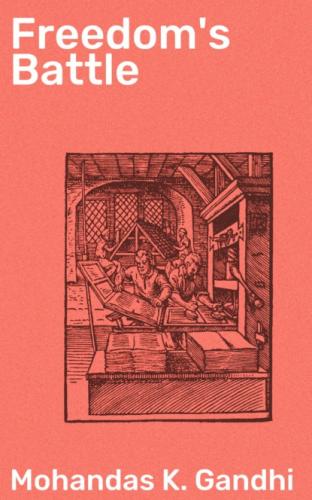In fact I believe that I have rendered a service to India and England by showing in non-co-operation the way out of the unnatural state in which both are living. In my humble opinion, non-co-operation with evil is as much a duty as is co-operation with good. But in the past, non-co-operation has been deliberately expressed in violence to the evil doer. I am endeavouring to show to my countrymen that violent non-co-operation only multiplies evil and that as evil can only be sustained by violence, withdrawal of support of evil requires complete abstention from violence. Non-violent implies voluntary submission to the penalty for non-co-operation with evil. I am here, therefore, to invite and submit cheerfully to the highest penalty that can he inflicted upon me for what in law is a deliberate crime and what appears to me to be the highest duty of a citizen. The only course open to you, the Judge and the Assessors, is either to resign your posts and thus dissociate yourselves from evil if you feel that the law you are called upon to administer is an evil and that in reality I am innocent, or to inflict on me the severest penalty if you believe that the system and the law you are assisting to administer are good for the people of this country and that my activity is therefore injurious to the public weal.
INTRODUCTION
After the great war it is difficult to point out a single nation that is happy; but this has come out of the war, that there is not a single nation outside India that is not either free or striving to be free.
It is said that we, too, are on the road to freedom, that it is better to be on the certain though slow course of gradual unfoldment of freedom than to take the troubled and dangerous path of revolution whether peaceful or violent, and that the new Reforms are a half-way house to freedom.
The new constitution granted to India keeps all the military forces, both in the direction and in the financial control, entirely outside the scope of responsibility to the people of India. What does this mean? It means that the revenues of India are spent away on what the nation does not want. But after the mid-Eastern complications and the fresh Asiatic additions to British Imperial spheres of action, this Indian military servitude is a clear danger to national interests.
The new constitution gives no scope for retrenchment and therefore no scope for measures of social reform except by fresh taxation, the heavy burden of which on the poor will outweigh all the advantages of any reforms. It maintains all the existing foreign services, and the cost of the administrative machinery high as it already is, is further increased.
The reformed constitution keeps all the fundamental liberties of person, property, press, and association completely under bureaucratic control. All those laws which give to the irresponsible officers of the Executive Government of India absolute powers to override the popular will, are still unrepealed. In spite of the tragic price paid in the Punjab for demonstrating the danger of unrestrained power in the hands of a foreign bureaucracy and the inhumanity of spirit by which tyranny in a panic will seek to save itself, we stand just where we were before, at the mercy of the Executive in respect of all our fundamental liberties.
Not only is Despotism intact in the Law, but unparalleled crimes and cruelties against the people have been encouraged and even after boastful admissions and clearest proofs, left unpunished. The spirit of unrepentent cruelty has thus been allowed to permeate the whole administration.
To understand our present condition it is not enough to realise the general political servitude. We should add to it the reality and the extent of the injury inflicted by Britain on Islam, and thereby on the Mussalmans of India. The articles of Islamic faith which it is necessary to understand in order to realise why Mussalman India, which was once so loyal, is now so strongly moved to the contrary are easily set out and understood. Every religion should be interpreted by the professors of that religion. The sentiments and religious ideas of Muslims founded on the traditions of long generations cannot be altered now by logic or cosmopolitanism, as others understand it. Such an attempt is the more unreasonable when it is made not even as a bonafide and independent effort of proselytising logic or reason, but only to justify a treaty entered into for political and worldly purposes.
The Khalifa is the authority that is entrusted with the duty of defending Islam. He is the successor to Muhammad and the agent of God on earth. According to Islamic tradition he must possess sufficient temporal power effectively to protect Islam against non-Islamic powers, and he should be one elected or accepted by the Mussalman world.
The Jazirat-ul-Arab is the area bounded by the Red Sea, the Arabian Sea, the Persian Gulf, and the waters of the Tigris and the Euphrates. It is the sacred Home of Islam and the centre towards which Islam throughout the world turns in prayer. According to the religious injunctions of the Mussalmans, this entire area should always be under Muslim
